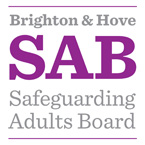Useful Guidance
Leaflets:
- What to do if you think someone is being abused, neglected or exploited – Leaflet
- What is Abuse? Where Can I Get Help? – Easy Read Leaflet
Safeguarding Adults Review (SAR) Protocol
Formerly known as Serious Case Reviews, Safeguarding Adults Reviews (SARs) are now a statutory duty under the Care Act for SABs to undertake. This is when:
- an adult dies as a result of abuse or neglect, whether known or suspected, and there is concern that partner agencies could have worked more effectively to protect the adult.
- an adult is still alive but has experienced serious neglect or abuse and there is concern that partner agencies could have worked more effectively to protect the adult.
This protocol will assist professionals to decide when to refer a case for consideration as a Safeguarding Adult Review, as well as providing guidance on the Safeguarding Adult Review process itself.
Any professional can make a referral. The SAR referral form is included as an appendix.
Access to adults suspected to be at risk or abuse or neglect
This guide clarifies existing powers and legal options relating to access to adults suspected to be at risk of abuse or neglect where access is restricted or denied. It is intended as a source of ready reference rather than as a learning tool, laying out the potential routes to resolution. It is important that social workers and their managers are as clear as possible on which legal powers or options apply to which situations, and in cases of any uncertainty that they consult their senior managers and/or the legal department of the Local Authority. Throughout the guide there are inks to information on the relevant legislation and case law.
Adult Safeguarding and Domestic Abuse
This guide is for practitioners and managers in councils and partner agencies engaged in working directly or indirectly with people who have care and support needs, whose circumstances make them vulnerable, and who may also be victims of domestic abuse. Its purpose is to help staff to give better informed and more effective support to people who need an adult safeguarding service because of domestic abuse. It addresses situations where an adult who has care and support needs is being harmed or abused by an intimate partner or close family member in a way which could also be defined as domestic abuse.
Commissioning for Better Outcomes
This guidance outlines standards to support a dynamic process of continuous improvement and, through self-assessment and peer review, to challenge commissioners and their partners, to strengthen and innovate to achieve improved outcomes for adults using social care, their carers, families and communities. The standards are relevant to all aspects of commissioning and service redesign, including decommissioning. The standards have been designed to reflect the improvements that experience has shown are needed, to support the transformation of social care to meet people’s reasonable aspirations, and to support the implementation of the Care Act 2014.
Prevention in Safeguarding
This guidance outlines a range of methods of preventing the abuse of vulnerable adults, from public awareness campaigns through to approaches that empower the individual to be able to recognise, address and report abuse. In addition, it examines policy and practice guidance and examples of emerging practice.
Safeguarding adults from harm
This guide is aimed primarily at practitioners working in various settings for organisations involved in safeguarding. But it may also be useful for volunteers and family. It aims to equip practitioners with information about how to assist and safeguard people. Knowing about the legal basis is fundamental, because the law defines the extent and limits of what can be done to help people and to enable people to keep themselves safe. This guide is intended to serve as a pointer to the law and to how it can be used. It tries to explain the law in reasonably simple terms, so it is selective and does not set out full details of each area of law covered. When it comes to the law, further advice will often be needed, but an awareness of it can help practitioners ask the right sort of question and explore possible solutions.
Stop, Look, Care
This booklet is designed to support Care Workers/Carers who work in any registered service in Brighton & Hove. This will support them with undertaking the National Care Certificate. Alternatively it can be used as a reference guide for families and personal assistants to promote awareness of certain needs and encourage referral if concerns are identified.
Care workers and Carers are in the ideal position to recognise changes in an individual’s condition by monitoring them and or recognising any deterioration in a persons wellbeing, this book aims to increase awareness and supports the Care worker/Carer to refer on when appropriate.
Combating Loneliness
This guide highlights that loneliness is a serious problem, with far reaching implications, not just for individuals, but also for wider communities. There is strong evidence that loneliness can increase the pressure on a wide range of council and health services. It can be a tipping point for referral to adult social care and can be the cause of a significant number of attendances at GP surgeries. There are practical steps agencies can take to address this issue which are outlined ion this guide. Whilst the guide focusses on older people its recommendations will also be beneficial to other age groups.
